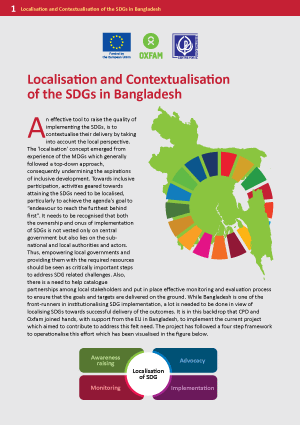 An effective tool to raise the quality of implementing the SDGs, is to contextualise their delivery by taking into account the local perspective. The ‘localisation’ concept emerged from experience of the MDGs which generally followed a top-down approach, consequently undermining the aspirations of inclusive development. Towards inclusive participation, activities geared towards attaining the SDGs need to be localised, particularly to achieve the agenda’s goal to “endeavour to reach the furthest behind first”. It needs to be recognised that both the ownership and onus of implementation of SDGs is not vested only on central government but also lies on the subnational and local authorities and actors. Thus, empowering local governments and providing them with the required resources should be seen as critically important steps to address SDG related challenges. Also, there is a need to help catalogue partnerships among local stakeholders and put in place effective monitoring and evaluation process to ensure that the goals and targets are delivered on the ground. While Bangladesh is one of the front-runners in institutionalising SDG implementation, a lot is needed to be done in view of localising SDGs towards successful delivery of the outcomes. It is in this backdrop that CPD and Oxfam joined hands, with support from the EU in Bangladesh, to implement the current project which aimed to contribute to address this felt need.
An effective tool to raise the quality of implementing the SDGs, is to contextualise their delivery by taking into account the local perspective. The ‘localisation’ concept emerged from experience of the MDGs which generally followed a top-down approach, consequently undermining the aspirations of inclusive development. Towards inclusive participation, activities geared towards attaining the SDGs need to be localised, particularly to achieve the agenda’s goal to “endeavour to reach the furthest behind first”. It needs to be recognised that both the ownership and onus of implementation of SDGs is not vested only on central government but also lies on the subnational and local authorities and actors. Thus, empowering local governments and providing them with the required resources should be seen as critically important steps to address SDG related challenges. Also, there is a need to help catalogue partnerships among local stakeholders and put in place effective monitoring and evaluation process to ensure that the goals and targets are delivered on the ground. While Bangladesh is one of the front-runners in institutionalising SDG implementation, a lot is needed to be done in view of localising SDGs towards successful delivery of the outcomes. It is in this backdrop that CPD and Oxfam joined hands, with support from the EU in Bangladesh, to implement the current project which aimed to contribute to address this felt need.

